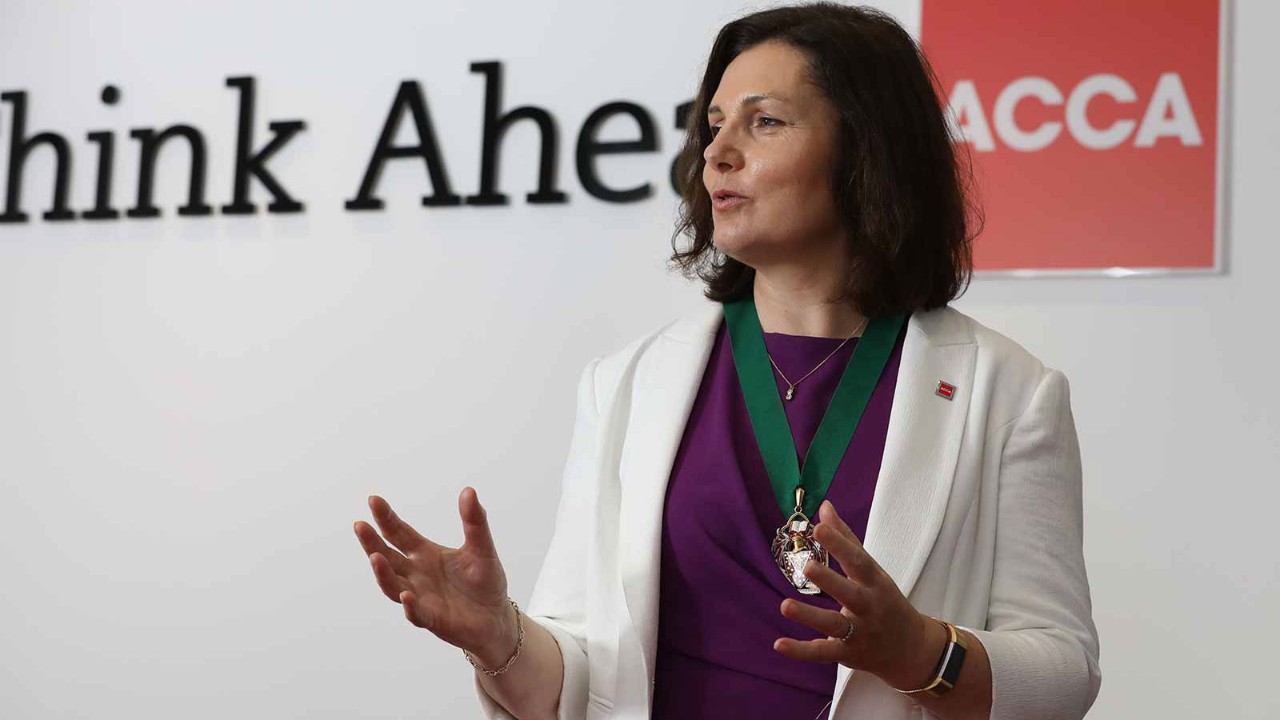
I became chair of ACCA Ireland a year ago, just as we entered lockdown for the first time. Few of us could then have suspected the long haul that lay ahead.
The move to remote working was the first challenge many of us faced, but it wasn’t necessarily straightforward for some small and medium practices. In response, we very quickly saw the strength of the ACCA network. The practitioners panel, in particular, worked tirelessly to support firms’ moves to cloud-based servers, with members on hand to offer advice and support.
Being sustainable
Most ACCA members will have been fortunate enough to keep jobs and incomes during the pandemic. As society emerges from lockdown measures, there are many ways that members can now provide leadership and support as the country charts a way forward.
Consider the climate change agenda, which has undoubtedly gathered pace over the past year as the benefits to the environment from changes in our behaviour became apparent. The following developments all show which way the wind is blowing:
- In a recent speech, Ed Sibley, Central Bank of Ireland deputy governor for prudential regulation, set out the bank’s priorities to improve governance, culture and decision-making, and to ensure that risks, such as disruption from climate change, are identified and effectively mitigated.
- In March 2021, the sustainable financial disclosure regulation of the European Securities and Markets Authority (ESMA) came into force. ESMA’s aim is to ensure that the financial markets support and promote the shift towards a greener and more sustainable economy by integrating environmental, social and governance (ESG) factors across core activities.
- At an overarching level, the European Green Deal, with its goal of making the EU carbon-neutral by 2050, will increasingly see companies raise finance on capital markets that attract ESG investors. That, in turn, will intensify the requirement for disclosures.
As ACCA members, we can play a major role in supporting these developments.
We need to find ways to ‘yes’ more often – as the late Nelson Mandela once said, it always seems impossible until it gets done
Going virtual
At the beginning of their term, the chair of ACCA Ireland sets out their objectives for the year ahead. Improvement in member engagement was top of my list in March 2020. For most of the past 12 months, virtual was the only route to achieve this. We moved very fast to increase the volume of CPD webinars and online events, delivering 82 to date. Panel members quickly pivoted to the new reality and guest speakers responded with great generosity, allowing us to deliver a full complement of content online.
As the year progressed, it was great to witness engagement among participants grow (noticeably through increased used of the chat function!) and to sense that members were getting real value from the webinars. While a return to in-person events is something to look forward to, the feedback has been that there will continue to be value in a strong online programme of events.
A second initiative I am delighted to have progressed during the year was the launch of support for ACCA returners in Ireland. With remote and flexible working now becoming more mainstream, this proved particularly opportune in its timing, offering a clear pathway back for many ACCA members who have left the workforce. The introduction of part-funded and fully funded programmes for the Diploma in IFRS from one of ACCA’s learning providers is just one of the ways ACCA Ireland can now support them.
Lessons learned
As I depart the role of chair, I’d like to sincerely thank the ACCA Ireland team and all my colleagues on ACCA’s regional and sectoral panels, for stepping up to the mark in this most difficult of years. I’d also like to express my appreciation to ACCA members across the country, who have truly supported each other and showed care and consideration for their clients, their colleagues and the community.
A number of lessons stand out from the year and will inform my thinking as we look to brighter days ahead:
- The importance of business continuity planning and ensuring our businesses are resilient – not only in relation to our operations but also our sources of finance – has become clear.
- Equally apparent is the value of connections and relationships in both our personal and professional lives. Investing time with our colleagues and our clients during difficult times will result in stronger collaboration in the future.
- Greater discipline is needed in our decision-making, focusing on facts and on planning for the long term. Overoptimistic thinking in the short term has been shown to lead to false dawns, which require huge energy to rebuild ourselves from. I’m drawn here to stress the importance of the Stockdale Paradox: you must never confuse faith that you will prevail in the end, which you can never afford to lose, with the discipline to confront the most brutal facts of your current reality, whatever they might be.
- We need to find ways to say ‘yes’ more often – as the late Nelson Mandela once said, it always seems impossible until it gets done. Being adaptable and agile has prevailed and the transformation we’ve witnessed in the past 12 months has been nothing short of remarkable. Board meetings being held virtually, documents signed electronically and year-end audits conducted remotely were all – a year ago – ‘impossible’.
- When we are faced with the next pandemic, we now know the playbook: lockdown completely, mask up, keep our distance and exit with reference to predetermined metrics.


